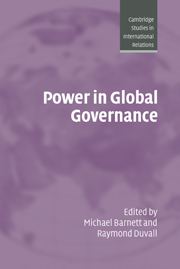Book contents
- Frontmatter
- Contents
- Notes on the contributors
- Acknowledgements
- 1 Power in global governance
- 2 Power, institutions, and the production of inequality
- 3 Policing and global governance
- 4 Power, fairness, and the global economy
- 5 Power politics and the institutionalization of international relations
- 6 Power, governance, and the WTO: a comparative institutional approach
- 7 The power of liberal international organizations
- 8 The power of interpretive communities
- 9 Class powers and the politics of global governance
- 10 Global civil society and global governmentality: or, the search for politics and the state amidst the capillaries of social power
- 11 Securing the civilian: sex and gender in the laws of war
- 12 Colonial and postcolonial global governance
- 13 Knowledge in power: the epistemic construction of global governance
- References
- Index
- CAMBRIDGE STUDIES IN INTERNATIONAL RELATIONS: 98
2 - Power, institutions, and the production of inequality
Published online by Cambridge University Press: 22 September 2009
- Frontmatter
- Contents
- Notes on the contributors
- Acknowledgements
- 1 Power in global governance
- 2 Power, institutions, and the production of inequality
- 3 Policing and global governance
- 4 Power, fairness, and the global economy
- 5 Power politics and the institutionalization of international relations
- 6 Power, governance, and the WTO: a comparative institutional approach
- 7 The power of liberal international organizations
- 8 The power of interpretive communities
- 9 Class powers and the politics of global governance
- 10 Global civil society and global governmentality: or, the search for politics and the state amidst the capillaries of social power
- 11 Securing the civilian: sex and gender in the laws of war
- 12 Colonial and postcolonial global governance
- 13 Knowledge in power: the epistemic construction of global governance
- References
- Index
- CAMBRIDGE STUDIES IN INTERNATIONAL RELATIONS: 98
Summary
This chapter is concerned with the ways in which power has been neglected within liberal writing on global governance and with the implications of that neglect. The first section examines the three varieties of liberal writing that dominated so much academic thinking within international relations in the 1990s and that continue to underpin much of the debate on global governance. Within this literature we find sophisticated accounts of how institutions emerge and how they function; we learn a great deal about processes of norm diffusion, socialization, and internalization; and we find illuminating accounts of the strategic choices of liberal hegemons and of how these choices may work to reinforce institutionalization. However, instead of being all-dominant, as on a neorealist reading, power recedes so far into the background that we are left with a strikingly apolitical and far too cosy a view of institutions and of global governance – especially when viewed from the perspective of weaker states (indeed perhaps from anywhere outside the United States).
In the second part of the chapter I underscore the importance of two critical aspects of how power is related to governance and globalization: the triple anchorage of states (in the international political system, in the global capitalist economy, and in transnational civil society); and the relational aspect of power and the complex ways in which power is received and understood by weaker actors.
- Type
- Chapter
- Information
- Power in Global Governance , pp. 33 - 58Publisher: Cambridge University PressPrint publication year: 2004
- 6
- Cited by



